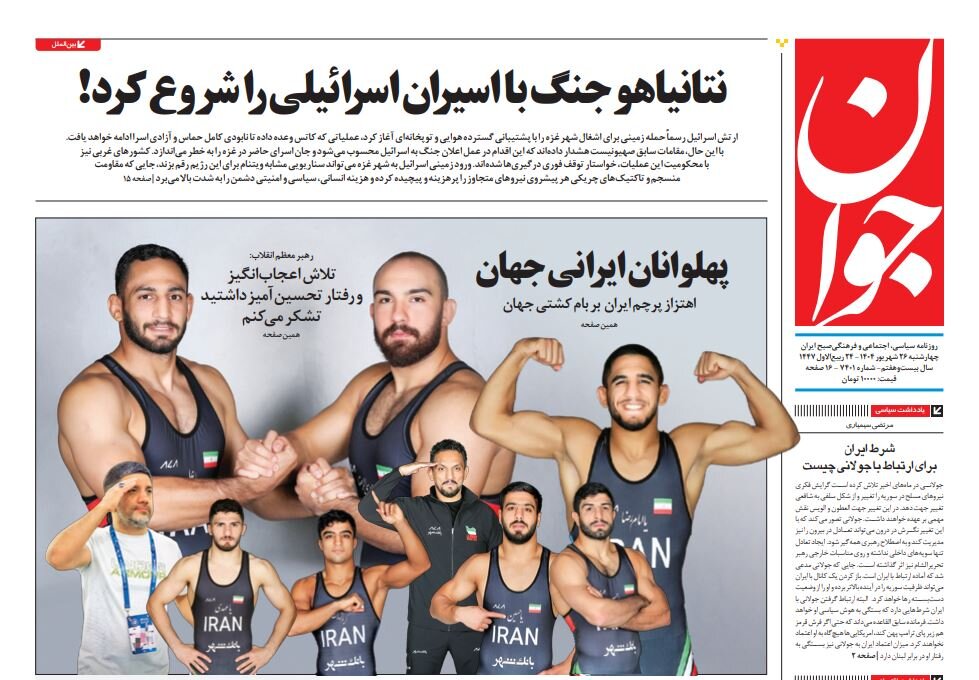Active diplomacy in shadow of Doha Summit’s passivity

TEHRAN - In a note, Javan discussed the visit of Dr. Ali Larijani, Secretary of the Supreme National Security Council, to Riyadh and wrote: This visit is taking place in a situation in which only a few hours have passed since the Islamic countries’ summit in Doha, a summit that, despite extensive propaganda, failed to reach a practical solution to confront the Zionist regime’s military misadventures.
While the Zionist regime as the main enemy of the Islamic world is continuing its aggressive actions with the open support of the West, the silence and passivity of some Islamic states have become more and more challenging to the region’s unity and political power. In these circumstances, Larijani’s visit to Saudi Arabia should be evaluated as more than an ordinary diplomatic trip. It can be a sign of the Islamic Republic’s effort to move beyond diplomacy and create real interaction at the regional level. Furthermore, it can be evaluated not only in terms of strengthening bilateral cooperation, especially in the economic fields, but also from a strategic point of view.
Sobh-e-No: Against a common enemy
In an analysis, Sobh-e-No discussed the emergency meeting of Islamic leaders in Doha on September 15 and wrote: This meeting was a direct response to the Israeli regime’s airstrike on the Palestinian resistance leaders’ meeting in Qatar. The attack, which the Iranian president called an “aggression against diplomacy”, exposed deep-running problem in the international system and emphasized the need to create a common Arab-Islamic unanimity. In his speech, Pezeshkian raised several key points: strong condemnation of the attack on Doha, criticism of the Israeli regime’s immunity in the international arena, and a structured description of Israel’s crimes as part of its doctrine of ethnic cleansing and expansionism. This tone showed that Iran was trying to take advantage of the historical opportunity to move the meeting’s agenda from the level of symbolic statements to the realm of real decision-making. Although the emergency summit of Islamic leaders in Doha marked a turning point in the Arab-Islamic confrontation with Israel, the success of this summit depends on whether Arab and Islamic countries are willing to pay the price for decisive decisions.
Vatan-e-Emrooz: Convergence of Eurasian powers
Vatan-e-Emrooz commented on the convergence of regional powers, writing: China, Russia, North Korea, and Iran have shown greater political and military convergence in recent years. From joint maneuvers to economic agreements, the main goal is to reduce dependence on the West and weaken the position of the United States. However, conflicts of interest are also seen in this bloc; Russia and China are secretly competing for influence in Central Asia, and Iran and Russia also have conflicting interests in the energy market. Therefore, this convergence is considered a kind of tactical cooperation against the Western order rather than a long-term strategic alliance. The Zionist regime's attack on Qatar will likely lead the regional Arab countries to review their policies. Although they are trying to look at the issue calmly and reduce the escalation of tensions with the Zionists and the United States, they have realized that they are alone and must think about new security partners for themselves. This issue may bring them closer to the East and, at the very least, make them think about how to ensure their security independently or through regional cooperation.
Donya-Eqtesad: The missing link in Tehran-Riyadh ties
Donya-Eqtesad analyzed the reawakened ties between Iran and Saudi Arabia and wrote: The high-level and relatively regular meetings between senior Iranian and Saudi officials over the past two and a half years can be considered one of the important points in reinforcing this revived relationship, which, in an atmosphere of escalating tensions and the activation of regional fault lines, has been able to move step by step towards a new understanding of the characteristics and requirements of neighborhood policy. In order not to get caught in a tense atmosphere, it is necessary for security and political authorities of the two countries to first reach a common understanding on trust-building measures and then take the initial steps toward economic cooperation. Tehran and Riyadh must use Israel's tension-building in the region as an opportunity to bring their views closer together. In this context, Iran's engagement with a comprehensive regional approach is an important principle. Iran must reconsider its regional approach and move towards participatory formats. Such a shift is a necessity and a new capacity in Iran's Middle East approach.
Leave a Comment